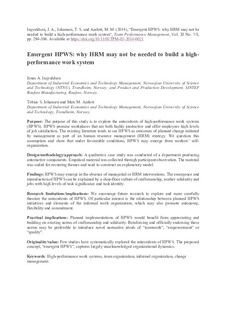| dc.contributor.author | Ingvaldsen, Jonas A | |
| dc.contributor.author | Johansen, Tobias Strand | |
| dc.contributor.author | Aarlott, Mats Mathisen | |
| dc.date.accessioned | 2017-10-04T11:17:36Z | |
| dc.date.available | 2017-10-04T11:17:36Z | |
| dc.date.created | 2014-09-24T08:48:54Z | |
| dc.date.issued | 2014 | |
| dc.identifier.citation | Team Performance Management. 2014, 20 (7/8), 294-306. | nb_NO |
| dc.identifier.issn | 1352-7592 | |
| dc.identifier.uri | http://hdl.handle.net/11250/2458345 | |
| dc.description.abstract | Purpose High-performance work systems (HPWS) promise workplaces that are both highly productive and offer employees high levels of job satisfaction. The existing literature tends to see HPWS as outcomes of planned change initiated by management as part of an HRM strategy. We question this assumption and show that under favourable conditions, HPWS may emerge from workers’ self-organization. Design/methodology/approach A qualitative case study was conducted of a department producing automotive components. Empirical material was collected through participant observation. The material was coded for recurring themes and used to construct an explanatory model. Findings HPWS may emerge in the absence of managerial or HRM interventions. The emergence and reproduction of HPWS can be explained by a shop-floor culture of craftsmanship, worker solidarity and jobs with high levels of task significance and task identity. Research limitations/implications We encourage future research to explore and more carefully theorize the antecedents of HPWS. Of particular interest is the relationship between planned HPWS initiatives and elements of the informal work organization, which may also promote autonomy, flexibility and commitment. Practical implications Planned implementations of HPWS would benefit from appreciating and building on existing norms of craftsmanship and solidarity. Reinforcing and officially endorsing these norms may be preferable to introduce novel normative ideals of “teamwork”, “empowerment” or “quality”. Originality/value Few studies have systematically explored the antecedents of HPWS. The proposed concept, “emergent HPWS”, captures largely unacknowledged organizational dynamics. | nb_NO |
| dc.language.iso | eng | nb_NO |
| dc.publisher | Emerald | nb_NO |
| dc.title | Emergent HPWS: why HRM may not be needed to build a high-performance work system | nb_NO |
| dc.type | Journal article | nb_NO |
| dc.type | Peer reviewed | nb_NO |
| dc.description.version | acceptedVersion | nb_NO |
| dc.source.pagenumber | 294-306 | nb_NO |
| dc.source.volume | 20 | nb_NO |
| dc.source.journal | Team Performance Management | nb_NO |
| dc.source.issue | 7/8 | nb_NO |
| dc.identifier.doi | 10.1108/TPM-03-2014-0021 | |
| dc.identifier.cristin | 1157310 | |
| dc.relation.project | Norges forskningsråd: 210671 | nb_NO |
| dc.description.localcode | © Emerald Publishing Limited 2014. This is the authors' accepted and refereed manuscript to the article. | nb_NO |
| cristin.unitcode | 194,60,25,0 | |
| cristin.unitname | Institutt for industriell økonomi og teknologiledelse | |
| cristin.ispublished | true | |
| cristin.fulltext | original | |
| cristin.fulltext | postprint | |
| cristin.qualitycode | 1 | |
